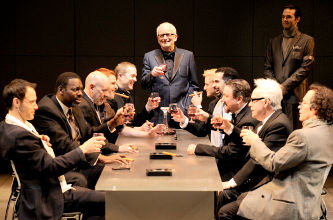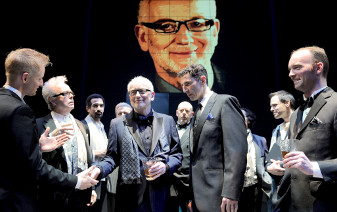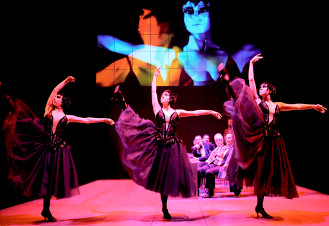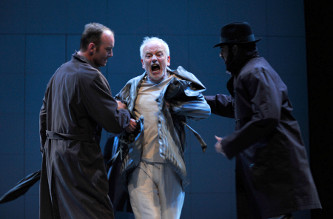Summary 
Slick and efficient production modernizes the cynical but simple play, the title character undertaking an arc from philanthropic CEO of a decadent Fortune 500 firm - martinis, cigars, strippers - to penniless madman raging at the ingratitude of humanity from an oceanfront cave. A better realization than its script, with one character and a single plotline, effectively visualized and enhanced with a bluesy guitar score.
Design
Directed by Barbara Gaines. Scenic design by Kevin Depinet. Costume design by Susan E. Mickey. Lighting design by Robert Wierzel. Projection Design by Mike Tutaj. Original Music and Sound Design by Lindsay Jones.
Cast
Kevin Gudahl (Writer/Judge), Timothy Edward Kane (Artist), Bruce A. Young (Lucullus), William Dick (Jeweller), Ian McDiarmid (Timon), Sean Fortunato (Flavius), Terry Hamilton (Old Senator), David Schlumpf (Antonius), James Newcomb (Apemantus), Samuel Taylor (Lucius), Terry Hamilton (Ventidius), David Lively (Sempronius), Danforth Comins (Alcibiades).
Analysis

Director Barbara Gaines' modernized version of Timon of Athens, Shakespeare's decidedly misanthropic tragedy - the more you give, the less you receive - is even more cynical than its source, adding an act of suicide and a dismal glimpse of a more-of-the-same future with a suddenly wealthy Flavius. Gaines begins 1.1 within a stylish big-company boardroom, eight sleek blue-and-black projection monitors displaying the Timon Capital logo above a wooden conference table. Eight young corporate traders, all in business suits, clamor and shout, some into telephones, as the screens project the scrolling trading board of an exchange. To the rumbling growl of a guitar-heavy blues tune - "the running of the bulls" - the traders burst into laughter and victorious shouts, slapping one another on the back.
Gaines' vision of Timon's daytime money-making gives way to a glimpse into his night-time money spending. The stage swirls 1.2 with big round bubbles of light as if a night club piano bar, the exclusive men's society lighting cigars and brandishing martini glasses or brandy snifters, served by waiters in black tuxedoes. Familiar Chicago Shakespeare veterans portray the secondary characters: Kevin Gudahl is the pedantic Writer in permed hair, a collegiate scarf, and horn-rimmed glasses; and Timothy Edward Kane is the pretentious Artist, a purveyor of digital computer art who fashions the pixilated full-color portrait of Timon that is projected on the upstage screens.

Scot actor Ian McDiarmid as Timon makes his first appearance as if a celebrity at an awards gala or a popular talk show, spot-lit as he walks in from the back of the audience, shaking hands, slapping backs, sideways man-hugging, and greeting friends, all of them men. He wears short white hair, black glasses, a bow tie and a big smile, resembling everyone's favorite (deep-pocketed) college professor. After McDiarmid's Timon goes to shake a man's hand and hugs him instead, then hands off a drained glass to the man next to him, an MC emerges to belt out a bluesy version of "Money (That's What I Want") in a glaring spot.

The only dissent - and that, ineffectual - comes from Apemantus, a George-Carlin-like Bohemian in a T-shirt under a button-down under a sport coat, munching a carrot in obvious bemused disgust as Timon is given a garland and prodded downstage by his fair-weather friends. Gaines reveals the moral squalor of this old-boys' club as the businessmen are entertained by a group of five dancers, three of them women in short dark hair, all dancing to tango-like guitar music amid pulsating purple and white bursts of light. Video projections highlight the lithe dancers, and the lighting transforms to scarlet and the music to sexy saxophone as the female dancers strut and pout, transforming into pay-for-hire strippers who service the men with lewd moves and lap dances, accepting cash tips as they shimmy to exit downstage.

Gaines moves swiftly through the Act 3 betrayal scenes, focusing more on the cause - the lavish self-indulgence of the nightclub - as well as on the effect, especially Timon's solitary torment in a cave on the coast. After 2.2 breakfast with a common-sense and no-nonsense Flavius in which his financial straits become apparent, McDiarmid's Timon beseeches whom he thought were his friends, and to searing blues guitar riffs, he clutches at his chest and collapses, denied yet a third time. He serves his false friends stones in water, yanking the tablecloth to send dishes and cutlery and stones flying. Becoming unhinged, he lunges after his former compatriots with silverware and breaks a champagne flute to use as a weapon, while Kane's opportunistic Artist shoots the mayhem with his cell phone video camera. After Flavius and the servants emerge from upstage to sadly begin a clean-up of the "broken implements of a ruined house," Timon summons via remote control his impressive black-and-blue futures board. He brings the first half to its conclusion as he stands atop his conference table and unbuttons his dress shirt, then smashes the remote and swigs from a liquor bottle. Apemantus observes silently from offstage left, and he whispers a melancholy, "amen."
Gaines' second half begins with the roar of incoming tide and a stunning three-dimensional projection upstage of an oceanfront beach, complete with rippling sand dunes and scattered driftwood.
Rolling ocean fog even drifts in, and McDiarmid's Timon awakes with a comical "oh!" to rise from the sand in a dirty heap, only to fall into the cave-like "pit" at center stage. The performance is certainly sympathetic - "what is here: gold!" followed by a bemused glance at the audience that brings laughter - despite the one-note misanthropy that marks the latter half of Shakespeare's text, and the simple series of same-location encounters that ensue. After digging gold bars from various sand pits across the stage, Timon defies a pair of mercenary soldiers in boots and berets - "with man's blood paint the ground!" - then sends the leader off with bars of gold ("let this doom you") and an insult: "get thee away and take thy beagle with thee."

After encounters with the I-told-you-so Apemantus - "I'd beat thee but it'd affect my hands" - Timon endures the Writer and Artist 5.1 before chasing them yelping offstage, then more black-clad invading soldiers led by Alcibiades. After weeping himself to asleep, he is awakened by his faithful steward Flavius, and he shares with him his treasure cave, literally aglow with riches of gold. Sean Fortunato's bug-eyed Flavius exits stammering, one of the few uncorrupted souls in the entire play. His exit is followed hard by the arrival of Athenian Senators, two blowhards, one an overdone modern Texan with a cowboy hat and cowboy boots, wiping sweat from his face with a handkerchief and delivering his lines in an exaggerated drawl. The exit of the Senators is followed by the sounds of war and the invasion of their enemies, Alcibiades' army including roaring jet-fighters and buzzing helicopters.
On his invasion beachhead, Alcibiades crouches and reads Timon's epitaph as the little white-haired man emerges into a white pool of light deep within the audience. Then in sudden silence, McDarmiad's Timon steps onstage toward the beach, disrobes completely, and to the rising sound of the incoming tide, walks naked upstage to be lost in the darkness of the ocean.
Gaines concludes her production - elegantly designed, finely acted, quickly paced - with a non-textual epilogue that speaks to the prevalence of greed and the continuation of ugly circumstances. Flavius, surrounded by friendly-appearing businessmen and supposed supporters, takes the stage as the new CEO-of-the-moment, his smiling face projected on the upstage screen, and he appears thrilled, in deep bluish light, to be the next victim.